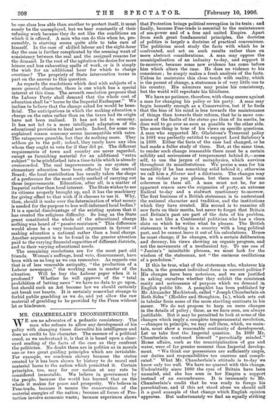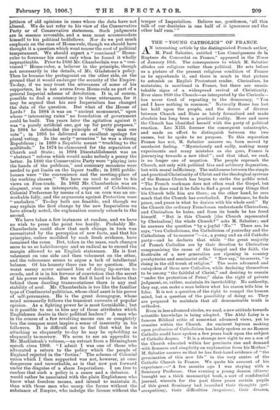MR. CHAMBERLAIN'S INCONSISTENCIES.
WE are no advocates of a pedantic consistency. The man who refuses to allow any development of his policy with changing times discredits his intelligence and does no credit to his character. The essence of a political creed, as we understand it, is that it is based upon a clear- eyed reading of the facts of the case as they confront the politician. No doubt there are in politics as in morals one or two great guiding principles which are inviolable. For example, we condemn slavery because the status created by it has been shown by history to do moral and material harm to the nation which permitted it. Certain principles, too, may for our nation at any rate be considered immutable. We believe in government by the people, because the world has learned that on the whole it makes for peace and prosperity. We believe in Free-trade, because it means the conservation of the material energies of the nation ; because all forms of Pro- tection involve economic waste; because experience shows that Protection brings political corruption in its train ; and finally, because Free-trade is essential to the maintenance of sea-power and of a free and united Empire. Apart from such great fundamental principles, the doctrine of politics is largely a doctrine of practical convenience. The politician must study the facts with which he is confronted, and act on such results rather than on mere abstract considerations. A man may oppose the municipalisation of an industry to-day, and support it to-morrow, because some new evidence has come before him which alters the case. He does no violence to his conscience ; he simply makes a fresh analysis of the facts. Unless he maintains this close touch with reality, which is the parent of change, a statesman is of very little use to his country. His admirers may praise his consistency, but the world will reprobate his blindness.
We have no patience, therefore, with cheap sneers against a man for changing his policy or his party. A man may begin honestly enough as a Conservative, but if he finds that the bias of his mind is less towards the maintenance of things than towards their reform, that he is more con- scious of the faults of the status quo than of its merits, he does well to go over as soon as possible to the other side. The same thing is true of his views on specific questions. A man who supported Mr. Gladstone's Transvaal policy in 1881 was perfectly entitled to support Lord Salisbury's in 1899. Either the facts of the case had changed, or he had made a fuller study of them. But, at the same time, to render such change reasonable there must be a certain solidity and seriousness of temperament behind it,—some self, to use the jargon of metaphysics, which survives throughout its manifestations. We praise a man for his versatility if he has something solid behind it ; otherwise we call him a ficineur and a dilettante. The changes may be as violent as you please, but there must be some coherence in them all. A man must not be, for no apparent reason save the exigencies of party, an extreme Radical to-day and a stalwart reactionary to-morrow. The first business of a British statesman is to understand the national character and tradition, and the institutions which they have created. His second is to examine all new facts on their merits, but never to forget that Britain and Britain's past are part of the data of his problem. He is not like a Continental politician who has a clean slate on which he writes what he pleases. The British statesman is working in a country with a long political past, and he cannot leave it out of his calculations. Hence he must change, if he changes, with a certain deliberation and decency, his views showing an organic progress, and not the movements of a mechanical toy. To use one of " Junius's " inimitable phrases, we must look for the wisdom of the statesman, not " the ominous oscillations of a pendulum."
If this be true, what of the statesman who, whatever his faults, is.the greatest individual force in current politics ? His changes have been notorious, and we are justified in asking ourselves whether they exhibit the consistent sanity and seriousness of purpose which we demand in English public life. A pamphlet has been published by Mr. Alexander Mackintosh, called. " Joseph Chamberlain on Both Sides" (Hodder and Stoughton, ls.), which sets out in tabular form some of the more startling contrasts in his career. We do not propose to harp on mere changes in the details of policy ; these, as we have seen, are always justifiable. But it may be permitted to look at some of the changes which imply a complete temperamental revolution, —changes in principle, we may call them, which, we main-. tain, must show a reasonable continuity of development. Let us take first the Imperial question. In 1880 Mr. Chamberlain confessed himself "parochially minded." Home affairs, such as the municipalisation of gas and water, were of far greater moment than Imperial develop- ment. " We think our possessions are sufficiently ample, our duties and responsibilities too onerous and compli- cated." What Mr. Chamberlain's attitude is to-day we know only too well. We have no quarrel with this change. Undoubtedly since 1880 the eyes of Britain have been unsealed, and she has seen in her Empire a support instead of- an encumbrance. It is immensely to Mr. Chamberlain's credit that he was ready to forego his parochialism, and if this act stood alone we should call it a good example of that change which English opinion approves. But unfortunately we find an equally striking jettison of old opinions in cases where the data have not altered. We do not refer to his view of the Conservative Party or of Conservative statesmen. Such judgments are in essence revocable, and a man must accommodate himself to his political bedfellows. Nor do we put much emphasis on the case of Home-rule, though we should have thought it a question which went nearer the root of political temperament. We should expect a " convinced " Home- ruler to forswear his creed only when he found it wholly impracticable. Prior to 1886 Mr. Chamberlain was a " con- vinced " Home-ruler, a believer in the principle, though not necessarily in the details, of Mr. Gladstone's policy. Then lie became the protagonist on the other side, on the ground that it would endanger the security of the Empire. To-day, if we may trust the utterances of some of his supporters, he is not averse from Home-rule as part of a general Imperial scheme of devolution. It is, of course, possible to find a consistency in these utterances, for it may be argued that his new Imperialism has changed the data of the question. But what of the House of Lords ? In 1884 it was an " ancient monument," upon whose " interesting ruins " no foundation of government could be built. Ten years later the agitation against it was "a purely artificial one, got up for party purposes." In 1884 ho defended the principle of " One man one vote " ; in 1895 he delivered an excellent apology for plural voting. In the early " seventies " he was a strong Republican ; in 1889 a Republic meant " truckling to the multitude." In 1874 he clamoured. for the separation of Church and State ; in 1894 Disestablishment was an " abstract " reform which would make nobody a penny the better. In 1880 the Conservative Party were " playing into the hands of the publican," and summary measures were needed to put limits on the liquor traffic ; in 1895 public- houses were " the convenience and the meeting-place of the working classes." We have no need to refer to his views on Free-trade. In 1882 Mr. Chamberlain was an eloquent, even an intemperate, exponent of Cobdenism, Colonial Preference by means of a tax on corn was an un- workable folly, and the arguments against Protection were " unshaken." To-day both are feasible, and though we may explain the first change by the new Imperialism we have already noted, the explanation scarcely extends to the second.
We have taken a few instances at random, and we have no wish to press the point too hardly. Probably Mr. Chamberlain could show that each change in turn was necessitated by the perception of new facts, and that his principles, unless modified by such fresh evidence, have remained the same. But, taken in the mass, such changes seem to us so kaleidoscopic and so radical as to exceed the margin allowed to an English statesman. He is first vehement on one side and then vehement on the other, and the vehemence seems to argue a lack of intellectual balance. Of his honesty there can be no question. His worst enemy never accused him of doing lip-service to creeds, and it is in his fervour of conviction that the secret of his power resides. But we find it bard to believe that behind these dazzling transmutations there is any real stability of soul. Mr. Chamberlain is too like the familiar type of Continental politician, whose chief asset is his power of self-persuasion. He is the great demagogue, whose mind necessarily follows the transient currents of popular opinion. As a fighting power he is most formidable ; but is it possible to see in him any of those attributes which Englishmen desire in their political leaders ? A man who in the course of a few revolving moons can so completely box the compass must inspire a sense of insecurity 'in his followers. It is difficult not to feel that what he is attacking so eloquently to-day he may be upholding as eloquently to-morrow. We seem to see an appendix to Mr. Mackintosh's volume,—an extract from a Birmingham speech circa 1908. " I admit I was one of those who advocated a return to the policy which the people of England rejected in the forties.' The scheme of Colonial union which I then supported was not, however, at once dangerous and unworkable, as is that now put forward under the disguise of a sham Imperialism. I am free to confess that such a policy is a snare and a delusion. I would rather be associated with the plain Englishmen who know what freedom means, and intend to maintain it, than with those men who usurp the forms without the substance of Empire, who indulge the license without the temper of Imperialism. Believe me, gentlemen, ' all this talk of our destinies is one half of it ignorance and the other half rum.'











































 Previous page
Previous page